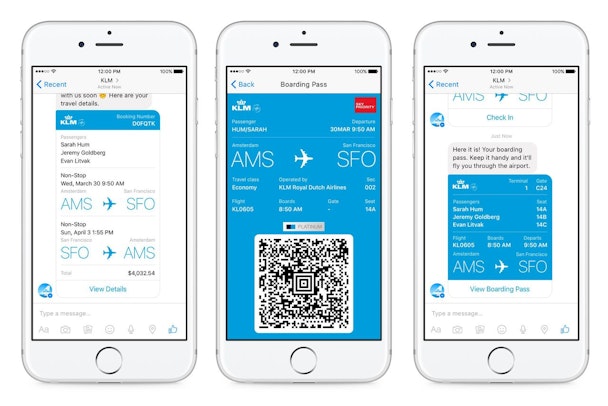KLM social boss anticipates death of company websites as it turns focus to chat apps
As artificial intelligence becomes available at scale to brands, KLM is turning to chat bots to try and provide a form of interaction that is intuitive and more natural to customers.

There has been a significant shift in where KLM is focusing its attention (and budgets) in recent months. Not so long ago, its own website and app were the channels of choice for connecting with fliers but the Dutch airline has accepted that they simply aren’t where the customer is going today and is prioritising chat apps such as Facebook’s messenger and WeChat instead.
This change in tact is unsurprising when you consider the figures KLM is working against; currently it receives around 125,000 queries a week from passengers across a multitude of platforms. But last November it became the first airline to bet on Facebook Messenger, offering the option to have booking confirmation and boarding passes sent via the platform as well as answer any queries. On the day of its activation, the airline saw a 40 per cent increase in the number of questions coming through from users.
“Business is moving away from company apps,” Gert Wim ter Haar, Social Media Hub manager at KLM said at the DMWF conference in Amsterdam this week.
“We’re seeing a strong shift in customers preferring [chat] apps rather than sending that public tweet or message. It’s more personal.”
Expectation and Facebook bots
However, with the promise of chatting to a brand like they are a friend comes the expectation from customers that they’ll get a reply in minutes, not hours. KLM has gained favour in the past with its vow to get back to a customer within the hour, but today those same customers on Messenger or WeChat will complain if they have to wait longer than 20 minutes for a reply.
“Customers are not satisfied with having to wait for an answer. When they chat with friends they get an answer within minutes. So with chat apps, the one-hour response isn’t good enough,” said Wim ter Haar.
Enter Facebook’s much discussed Bot Engine. KLM was, again, the first airline to sign up to use the suit of developer tools on the social giant was building and helped shape what was eventually unveiled last week at the F8 conference.
The bot is essentially a self-learning AI programme that can interact with people on Messenger to answer all manner of questions, with responses becoming more realistic the more frequently it’s used by Facebook’s platform of billions.
It’s the only solution for KLM to its biggest problem when it comes to success on chat apps – scale.
“Last week, during peak hours, we were receiving 13 messages a minute – this is huge. We have to have a system in place to cope with this which is where we need artificial intelligence. You have to find ways to make it easy to have a personal interaction but cope with the huge volumes,” Wim ter Haar continued.
“This is where it’s going. Facebook is basically the way to make it happen.”
Through Facebook Messenger, passengers can not only get their booking confirmation and boarding cards but can also ask for things like a change in seat or be alerted by if there is a change to the flight time and if they happen to lose luggage then no longer will passengers be forced to fill in a long “ugly” form. Instead, they can use the chat apps.
What the advent of artificial intelligence means for the 200 people KLM currently employs to handle the 125,000 queries coming in through digital channels each week remains to be seen, but as Wim ter Haar alludes there’s only so far a bot can go.
Highlighting the point with a brand perception graph, he revealed how people scored the brand when they were in talks over compensation. When customers were shown empathy, even if KLM didn’t pay out, they still gave the airline a high score of 7/10. But when no empathy was shown, even when the highest amount of compensation was awarded, KLM only scored 1.5/10.
“It has to stay personal so we have to find a balance - we can’t automate everything,” he said.
Moving forward, KLM’s focus will remain on chat app and trying to cope with the huge volumes of queries in a personalised way. It hopes to eventually add Whatsapp to its armoury, but is waiting on an official API for the platform.

